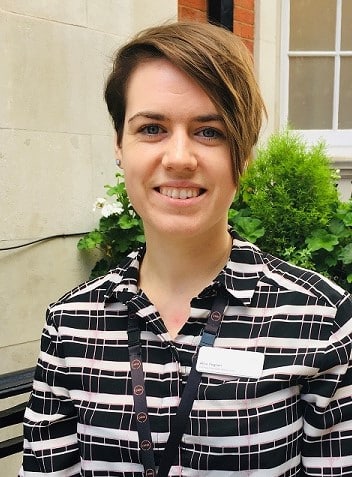Alice is one of Orri’s Eating Disorder Associates (EDAs) and has been part of the team since Orri reopened its face-to-face service this September. We sat her down to learn more about her role and interest in treating eating disorders…

How long have you been an Eating Disorder Associate (EDA) for and what were you doing before Orri?
I started as an EDA for Orri in September this year when the in-person service re opened. It has been a busy time but also wonderful to join the team and community at this time, where we are all coming together in this new beginning.
For the past year I have been working as a Dramatherapist in a bereavement service for children, adolescents, and young people. I completed my MA in Drama and Movement Therapy July 2019.
How would you describe your role to people outside Orri?
I would say an EDA is a point of call support person for the clients. We are someone they can come to, to share any worries, ask questions and also just have a friendly chat with. We keep clients company throughout the day during break times, offer meal time support and do a check out with them at the end of the day.
What do you enjoy most about your role?
The amount of time I am able to spend with clients throughout the day. I enjoy being there as support during some difficult times but also for the light-hearted moments of conversation and silliness. I also love the team work aspect of the role, working with other EDA’s and the rest of the clinical team means the support runs all through the community of Orri.
What do you feel is the most challenging aspect of your role?
It’s never easy to see someone who is distressed or going through a difficult time so for me that’s the most challenging part of it which of course also ties into the importance of the role too.
What do you feel is most unique about Orri?
Orri allows clients to have a wonderful balance of group and individual work. Each client has their own tailored care plan depending on their individual wants, needs and interests. But the community aspect of treatment and working as a group also allows learning and growth through each other.
Outside of work, what do you do for your own mental wellbeing?
I love to dance, I find putting some music on and just moving without thinking too much a really great outlet for me. I enjoy socialising and being around friends but equally love to settle in with a good book and my own company at times too.
What is your favourite inspirational quote?
I am yet to find out who originally said this quote but it was shared with me by a client I worked with during my dramatherapy training and has always stuck with me, I think it encompasses courage.
“It’s impossible” said Pride.
“It’s risky” said Experience.
“It’s pointless” said Reason.
“Give it a try” whispered The Heart.
Do you have a mental health hero?
I am a fan of Matt Haig and have been ever since reading his book “The Humans” (and he has since released other mental health related writings) that I personally found a beautiful read and very accessible.
Why did you decide to work in mental health?
I came into the mental health profession through working in the arts. I realised that I wanted to use the arts to fulfill a purpose other than to entertain. This is what led me to train as a creative arts therapist. There is so much power in being able to communicate and express yourself through creativity, particularly when things may be difficult to put into words, as emotions often are. The communication aspect of therapy fascinates me, I think a lot of the work comes from within the therapeutic relationship, figuring out the language of communication most comfortable for the client to express themselves.
If you had one piece of advice for a therapy-seeker, what would it be?
As daunting and exposing as it may feel to be starting therapy it is such a powerful process in getting to know yourself better and also empowering to give yourself that time, care and attention that you deserve! I believe it is beneficial for every single human for that reason.










